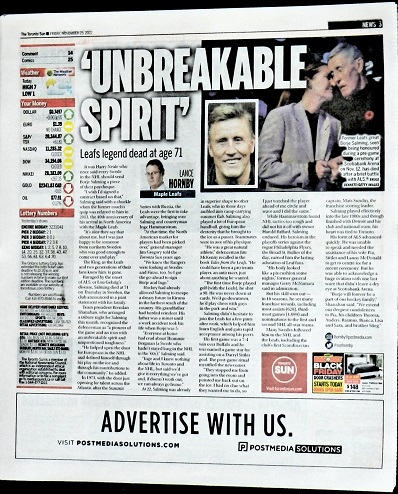TORONTO (Nov. 26) — The subject–matter of this blog is largely irrelevant. Of sole importance to hockey fans the world over is that Borje Salming died peacefully on Thursday in Stockholm, surrounded by the people he loved.
The news, though somber and regrettable, was met with near–universal relief, given the appalling final stages of Amytrophic Lateral Sclerosis (ALS, or Lou Gehrig’s Disease) that Salming mercifully evaded.
But, intrigue over his unexpectedly rapid decline remains close to the surface given that Sweden is not among the countries in which Medical Assistance In Dying (or MAID) has become legal. In fact, only six European nations — Austria, Belgium, Luxembourg, the Netherlands, Spain and Switzerland — have adopted the practice, amid varying circumstances. On Apr. 26, 2010, Sweden legalized passive euthanasia (the withdrawal of treatment or life–sustaining machinery), but still outlaws Physician–Assisted Suicide, an increasingly common application here in Canada. How, then, did the legendary Toronto Maple Leafs defenseman regress from standing, unaided, on the ice at Scotiabank Arena (Nov. 11 and 12) to passing away at home in the limited span of 12 days? With a condition — though unquestionably dire — that has a median survival rate, across the globe, of two to five years?
This answer is known only to Salming’s family and physicians. It is also their privilege.


Out of curiosity, however, I consulted two doctors here in Toronto that have dealt with end–of–life circumstances. Each told me it would have been rather easy — well within the boundaries of Swedish law and medical ethics — to help end Salming’s misery and allow him to escape the horrendous physical decline common with ALS.
Undoubtedly, it required Salming’s consent; those closest to him maintained there was no correlation between physical deterioration and his mental faculty. As such, the hockey pioneer would have been able to make a conscious decision about ending his life. After that, it was simply a matter of administering to the most–troublesome symptoms: those affiliated with the back of his throat. Friends and former teammates marveled over the conviction and courage required for Borje to make that long, final trip from Stockholm to Toronto, two weeks ago, for the annual Hockey Hall–of–Fame festivities. Amid the machinery that accompanied the great former defenseman was a suction device to clear his throat of phlegm — a normally routine action, but one he could no longer trigger.
“The disease had already robbed Salming of the muscle coordination for such a task,” explained a local physician. “Most of us can only imagine the aggravation and anxiety of not being able to clear the airway of even minor obstruction. Aspiration of phlegm and saliva triggers choking and respiratory distress, which is commonly treated with oxygen and suction. If such episodes no longer resolve — which was likely with Salming after he returned to Sweden from his trip to Toronto — a person becomes prone to respiratory arrest; in effect, the inability to breathe.

“That’s when the administration of an opioid such as Hydromorphone (also called Dilaudid) becomes necessary. And, it’s the juncture at which Salming would have needed to provide medical consent, for narcotics in an ALS patient can depress heart rate and respiration, leading to slow and shallow breaths that no longer sustain life. The most–common use of Hydromorphone is to relieve pain, but it can also alleviate respiratory distress associated with the feeling of impending suffocation, a common by–product of ALS. The more rapid administration of repeat doses allows for profound sedation during the process. If this is what happened with Salming — which I believe is accurate and humane — it is almost certain that he died peacefully, naturally, and unaware of his surrounding.
“Another genuine possibility,” surmised the doctor, “is that Borje was getting to the point in which he’d need a ventilator to breathe. Not just aspiration, but pneumonia caused by a virus or a bacterium would have presented a do–or–die dilemma. If he did not wish for such intervention, he could have been at the risk of encountering respiratory failure and a rather agonizing death. That’s when comfort measures, including Hydromorphone, would have hastened his demise… while also providing the necessary sedation and, more important, the alleviation of anxiety.
“Moreover, it would have been considered — under Swedish law — as treatment for an unresolvable condition, which is far different than administering a drug that stops the heart, as in MAID or physician–assisted death.”
All of which should provide comfort to Salming’s family, friends and countless admirers around the world.
EMAIL: HOWARDLBERGER@GMAIL.COM




































Can you imagine the mental fortitude required to make such a decision.
Borje was clearly in control, of his career, and his life, right to the end.
He will be missed.
Thank you, Howard, for an informed and helpful article.